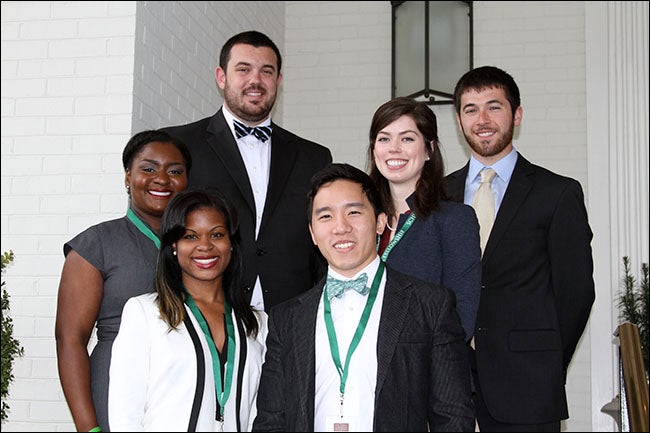Grad students to improve community health, personal leadership skills
Mia Marshall, Sola Ajewole, Lauren Brown and Hugh Quach, rising second-year students in ECU’s Brody School of Medicine, will empower underserved youth in local afterschool programs to live healthier lifestyles.
Their work is funded with a grant from Vidant Medical Center and supported by the medical school’s Office of Generalist Programs, which exists to encourage and support the education and development of primary care physicians – and to develop a community-responsive physician workforce – in eastern North Carolina.
Marshall and Ajewole will hold weekly workshops promoting self-esteem and healthy choices for African-American middle and high school girls at Building Hope Community Life Center. Brown and Quach will teach classes on nutrition and preventive health to middle schoolers at the Little Willie Center in an expansion of an earlier Schweitzer initiative – Strive HIGH – that began in 2012.
Mark Herring and Brandon Landreth, rising second-year students in ECU’s School of Dental Medicine, will provide oral health education, screenings and dental sealants to public elementary school students in Greene County. They also plan to connect the children and their families to ongoing oral health services.
Herring and Landreth’s efforts are funded by the Blue Cross and Blue Shield of North Carolina Foundation. They will operate in conjunction with Greene County Health Care, Inc., a community health center that’s federally qualified to receive enhanced reimbursement from government health programs like Medicare and Medicaid.
Approximately 250 students were chosen for the 2014-15 class of Schweitzer Fellows; 29 are in North Carolina. All Schweitzer Fellows work with mentors at one of 12 program sites – 11 in the U.S. and one in Lambaréné, Africa, where physician-humanitarian Dr. Albert Schweitzer founded a hospital in 1913.
Schweitzer Fellows develop and implement service projects that address the root causes of health disparities in under-resourced communities, while also fulfilling their academic responsibilities. Each project is implemented in collaboration with a community-based health or social service organization. Fellows come from all academic disciplines – medicine, occupational therapy, dentistry, social work and other allied health fields.
“Schweitzer Fellowships change lives, both of the individual fellows as well as those of the many vulnerable community members they serve through their projects,” said Barbara Heffner, program director for the North Carolina Albert Schweitzer Fellows Program. “Our fellows learn to lead and innovate as they tackle complex health needs – skills they will use again and again throughout their professional careers. Meanwhile, their project participants learn information, skills and behaviors that will assist them in leading healthier lives.”
“These Schweitzer Fellows are living Dr. Albert Schweitzer’s legacy of reverence for life,” said Sylvia Stevens-Edouard, ASF executive director. “Their fellowship year will leave them well prepared to successfully face the challenges of serving vulnerable and underserved populations, whose health and medical needs are many and varied.”
Since 1994, the North Carolina Albert Schweitzer Fellows Program has supported 391 fellows through funding from various foundations, academic institutions and individual donors. Upon completion of their fellowship year, Schweitzer Fellows become Schweitzer Fellows for Life and join a vibrant network of nearly 3,000 Schweitzer alumni who are skilled in – and committed to – addressing the health needs of underserved people throughout their careers.
